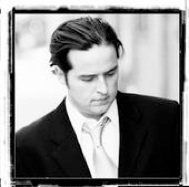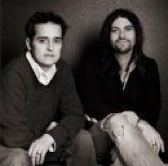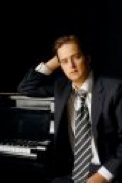In 1996, Paul Cardall released his impressive full-length freshman effort "Sign Of Affection." Since then he has been excelling in soothing piano instrumentation most significantly his milestone recording "The Looking Glass." The first obvious influence being the classically rooted David Lanz, Cardall has gone on to spread his wings musically and presented his listeners with more spatial themes that borrow from Vangelis and Mars Lasar. This theme is played out on the experimental and courageous "Faithful," his latest studio effort.
Paul has been very busy of late not only with the promotion of "Faithful" but also via his recently released "Live" album which represents a solid overview of his growing repertoire. But there is much more to this man than just a musical artist. With his faith playing a central and governing role in his life Paul Cardall has much to be thankful for.
Back in early 2004, I had the pleasure of a Q&A session via email in order to find out a little more about the man behind the artist. I will be interviewing with the artist in early 2008 for the second time. So here is the initial interview to give you an idea of where Paul’s musical exploration had taken him up to 2003. It will be interesting to see where his music and faith has taken him in the more recent years. Stay tuned.
MD: While your music has your own unique signature would it be fair to say that David Lanz had an influence on you?
Cardall: Before I picked up playing by ear, a friend of mine back in 1987 played me the tune "Behind the Waterfall" on the piano. The way he used arpeggio in his left hand was moving. He said it was a David Lanz tune. I was a fan immediately. When I got into the piano a year later, I would listen to David along with other pianists like George Winston, Michael Jones, Yanni, local Utah musician Jon Schmidt, and other pioneers of new age piano. I believe early on my music reflected their material until I was mature enough in my own skills to stand on my own. I should note that early on, like around 1988, as an arrogant teenager I had a chance to meet David at a local television station. I took a picture with him and said, "I'm also a pianist and will record with Narada one day so please remember me."
MD: If not who are some musicians that you have "borrowed" from and why?
Cardall: Early on I borrowed from all of the new age piano pioneers, like David, George Winston, Yanni, and others. However, after 1992, I stopped listening to other piano players. It was too much of a distraction. Through the years I've been influenced heavily by a wide variety of music from rock, country, classical, film scores and lately by brit-pop bands like Coldplay, Travis, Dido, and others.
MD: While "Sign of Affection" was your debut release, is there any archived material that you would consider putting out as a formal release?
Cardall: There is some. But I'll hang on to those. Sometimes a tune will float in my head through two records and make it on the third. "Danza Del Amor" on "Faithful" is actually a Spanish version of the tune "Sign of Affection" that I hung on to until the time was right.
MD: Released back in 1996, "Sign of Affectio"n has aged well so far. The credits mentioned a Yamaha C-7 and your most recent release, "Live," lists a Yamaha 9-foot grand piano. Is this your preferred manufacturer? If so why? If others, why them?
Cardall: Yamaha makes a great piano. Most studios I work in have a Yamaha so that's what I've worked with. I have a G5 grand in my home. It's a nice sounding pop piano. But, for "The Christmas Box" and "Hymns" I rented a Fazioli, which is a beautifully crafted Italian piano with a warmer and more intimate sound. The retail price for a Fazioli is somewhere around $175,000, which is interesting, compared to a $35,000 Yamaha. But, in all honesty, I don't think there is one company that can stand out from another although Yamaha seems to be the most popular. It depends on your music and what your goals are for the album.
MD: I cannot deny that to date "The Looking Glass" has been your most defining moment. This also included the support of the big boys Narada Records. Your time with them also include the festive The Christmas Box. What happened with your relationship with Narada?
Cardall: Thank you. My friends at Narada were very kind. I was honored to do those two projects with them. Both hit Billboards Top 25 New Age Charts and my audience expanded worldwide. However, after Virgin America purchased Narada they shifted their format to focus more on jazz and world music. At the time I was also heading in a different direction musically.
MD: It appears that Narada have diversified and drawn away from the more organic and earthy instrumentation. Is this indicative of the future of your present genre?
Cardall: Who knows? It seems like the '80s and early '90s was Narada's pinnacle of success along with Windham Hill and others. They found a niche in the music industry selling organic earthy instrumentation that critics labeled new age. But genres evolve or fade away with the times.
I remember commercial radio played "new age music" in the '80s but after a couple of years the stations moved towards smooth jazz. This caused a lot of artists to write more commercial smooth jazz to please labels and ensure lasting success.
There will always be people looking for reflective piano music in record stores. I don't think it will ever go away. Unfortunately, the number of piano CDs stocked at local music stores is rapidly dwindling in numbers. I'm not concerned with what's popular. I'm more concerned with satisfying my musical interests and interpretations. With my latest album, "Faithful," I chose a path that combines new age piano with down tempo or electronic music. Some other artists are heading in that direction as well. Who knows where it will take us. I've heard nothing but good things about my latest effort.
MD: It appears that you have managed to successfully self promote via your own independent label Stone Angel Music Inc. How is that progressing?
Cardall: Things are going well. I set up Stone Angel Music prior to the Narada deal. We've been fortunate to establish distribution through several channels. We've been able to quietly harvest a loyal fan base that continues to grow each year. I'm excited that more and more people are discovering my music. The ability to earn a living from creating and sharing music is a blessing.
MD: Your label's home page mentions consulting and film-scoring. Are these some other avenues that you would like to explore?
Cardall: I have ventured into consulting artists. When an artist starts out they have a lot of questions. In the past, I was bombarded with demos and questions from artists. As a consultant, I answer those questions and in the process help them understand the basic fundamentals of the music industry.
Asking me about Film-Scoring is like asking Hillary Clinton whether or not she wants to run for the Presidency. You know she does but not sure when. I am working towards this. I am passionate about film. It was my major in college. And I feel I have a lot to offer musically.
MD: I am sure there are advantages and disadvantages of self-promoting versus the support of a big label. What direction do you see yourself heading on a long-term basis?
Cardall: There are. Big labels have national distribution, which is really the only big advantage. Under Narada, as a team, we have access to thousands of stores but I, personally, had less control over marketing and sales of records. Under Stone Angel Music, I have several hundred stores and more control over how things proceed. The last two years we were able to move more units under my little label than Narada did in one.
So, I like the way things are going. But, I will still entertain a record deal because this time I would bring my years of experience and marketing vision to the table.
MD: Without a doubt your latest studio release, "Faithful," was a very courageous decision considering the faithlessness of some of us listeners. This album took a while to grow on me and required some patience. You could have played it safe. Why didn't you?
Cardall: I am evolving musically. I wanted to do something different. Something new. Something fresh. Faithful was an effort to be "faithful" to those feelings and introduce my audience to a style of music that moves me deeply. Although I like to explore new sounds I will never stray to far from my roots as a solo pianist.
MD: Much like David Lanz you decided to do a cover song and picked "Scarborough Fair" made famous by Simon & Garfunkel. What made you choose this particular song?
Cardall: The medieval folk tune has always been a favorite of mine. Paul Simon learned the song from Martin Carthy, a famous folk singer in the UK, while he was on tour there. I love the minor chords. It's a deep piece of music that I was confident enough to re-capture. The tune is a nice element of the "Faithful" disc.
MD: How has "Faithful" faired commercially in relation to your other albums?
Cardall: I have not released "Faithful" nationally like the others. It's only available in a handful of music stores throughout the Rocky Mountain Region and some 200 hundred-specialty stores around the country. I'm still shopping the record for the mainstream and lifestyle markets. But, it has sold consistently well like the others. And more importantly, although my fans admit it is an ambitious project, most of them feel it's the most powerful thing I've done.
MD: I would say that "Miracles was" your most blatant attempt at commercialism showing some smooth jazz tones to it. I must say I found it a most enjoyable and instantly appealing project. Any thoughts on revisiting this area?
Cardall: Thank you. I don't know if I'll ever do something as direct as "Driving North" featuring tenor sax player Greg Floor. But, I'm sure I'll explore music similar to "Leaving L.A." and "Sequoia's Path." Smooth Jazz is fun to play. It's light and carefree.
MD: You have also released two albums simply entitled "Hymns I" and "Hymns II." Spiritual or not, there is some wonderful music to be found in the church. What was your motive to complete these projects?
Cardall: Thank you. I am a deeply religious person. "Hymns I" and "Hymns II" are a collection of arrangements of hymns recognized and loved by millions of people around the world. The motive behind these projects was merely to share my heritage and Christian faith with my audience.
MD: How does your faith come into play each day both personally and in your professional career?
Cardall: My life, wife, family, and career revolve around my faith. I try to put God at the center of everything I do. Rich Denhart, head of A&R at Narada, made a nice observation of my music once when he told me, "Although your music expresses tones of sadness, there also seems to be a tone of hopefulness throughout the pieces." For me, life is a continual struggle but hope makes things serene. I turn inward when I am composing. I rely heavily on spirituality in order to reach that place inside of me where my music comes from. Without the spiritual aspect my music would have no depth or realism. I don't like to settle for anything else.
MD: And I guess this would be the politically correct question to ask right now. What do you think of the Mel Gibson movie "The Passion Of The Christ"?
Cardall: Gibson is a master storyteller. His film is more than a movie. It is a monumental experience. I see a lot of films. But this one is deeply personal for me. No one film has affected me like "The Passion..." But, that is because of how close the subject matter is to my heart. My love and commitment to Jesus, who I believe is mankind's Savior, deepened tremendously after viewing this film. It is a very personal film. However, other people may not be as affected by the movie as I was. Regardless of your faith or even if you're agnostic I do think people need to see this film.
MD: I understand that you were born with a heart defect that at one point placed your life in jeopardy. How has that effected your day to day living?
Cardall: I had heart surgery as an infant. My parents thought they might lose me. But, my childhood was fairly normal. As a teenager, I experienced other difficulties that required heart surgery. Again, my family and doctors thought I wouldn't make it. But, things have always turned out okay. I see a heart doctor every three-six months. I live my life fairly normal. At 30 years of age, I have defied doctors' expectations and now they are led to believe that I will be around for many more years. But, being faced with death so many times has made me a more spiritual person. I see things from a unique perspective. My heart problem is a gift from God that I wouldn't trade for anything in this world. It has helped make me who I am.
MD: I also see that you made a compilation entitled "Piano Portraits Volume 1" with fellow pianists Michael Hicks, Jon Schmidt and David Tolk. What brought the four of you together?
Cardall: These pianists all live in the Salt Lake City area. We cross paths. We're fairly good friends. It was Mike who came up with the idea of putting together "Piano Portraits" a collection of music from each of our recordings plus one original. Jon Schmidt is one of my mentors. He began performing in the late '80s. David Tolk is on the Northstar label and plays in several Utah bands. Michael does a lot of Christian themed music.
MD: As for your last project, "Live," for a live project, the production was outstanding. Granted it was an intimate setting that took place in the studio's orchestral room. How much overdubbing and fine-tuning took place after the initial taping?
Cardall: The only thing we did with the concert recording was mix a select number of songs from the show. In fact, a couple of tunes that I hoped would make the record didn't end up on it because there was bad noise in the background or cell phone in a couple places. But, for the most part it is as it was.
MD: It appears that most of your concert appearances are taking place close to your home base Utah. Any chances of extending these appearances even if they are courtesy of in-store appearances?
Cardall: I have a few shows this year outside of Utah. I recently signed with a booking agent and he booked some gigs in Florida, Michigan, Texas, and a couple other places. There will be many more in the future.
Over that past years and even this year, I visit a lot of states where I perform privately for church groups and charity organizations like; The American Heart Association, The Christmas Box Foundation (helping abused children), Hospice, University of Utah Foundation (medical research), and many others.
MD: And finally, what does the immediate future hold for Paul Cardall both personally and musically?
Cardall: I'm in the process of shopping "Faithful" to a couple of label for wider distribution. There is a Christmas album in the works, which will fall somewhere between the style of my albums "The Looking Glass" and "Faithful."
I've been commissioned to compose a piece in honor of Topaz, which was the internment of Japanese Americans during WWII. This was one of the worst violations of civil rights in the history of the United States. The government and the US Army, citing "military necessity," locked up over 110,000 men, women, and children in 10 remote camps. These Americans were never convicted or even charged with any crime, yet were incarcerated for up to 4 years in prison camps surrounded by barbed wire and armed guards. There is more information at:
topazmuseum.org
And I am putting together a concert with my band featuring music from "Faithful," "Miracles," and a few other recordings. We'll take this on the road in the fall and do a couple of shows around Christmas time and early winter.
Paul Cardall Discography:
Sign of Affection (1996)
The Christmas Box (1997) BWE Acoustic
Hymns: Piano Solos (1997) Stone Angel
The Looking Glass (1999) Narada
Hymns II: Piano Solos (2000) Stone Angel
Miracles: A Journey of Hope and Healing (2001) Stone Angel
Faithful (2003) Stone Angel
Live (2003) Stone Angel
Visit Paul Cardall's website for more info on his recording
Michael Debbage
April 2004



